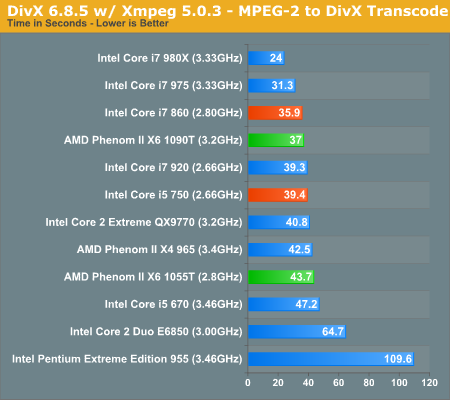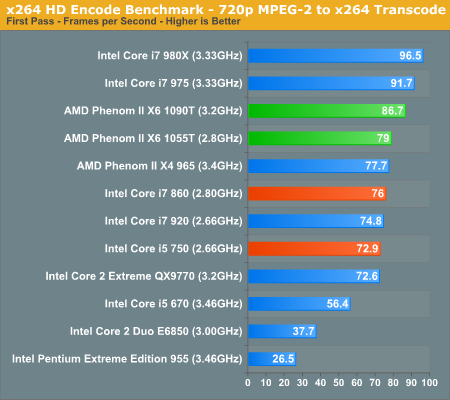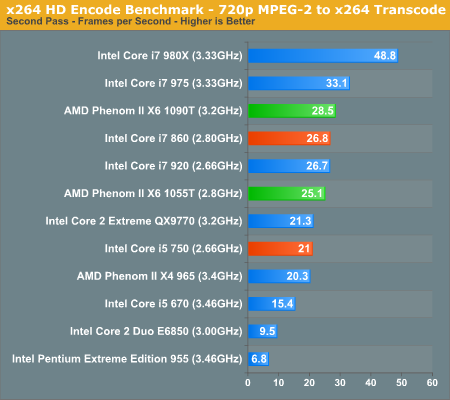AMD's Six-Core Phenom II X6 1090T & 1055T Reviewed
by Anand Lal Shimpi on April 27, 2010 12:26 AM EST- Posted in
- CPUs
- AMD
- Phenom II X6
DivX 6.8.5 with Xmpeg 5.0.3
Our DivX test is the same DivX / XMpeg 5.03 test we've run for the past few years now, the 1080p source file is encoded using the unconstrained DivX profile, quality/performance is set balanced at 5 and enhanced multithreading is enabled.
Thanks to AMD's Turbo Core the Phenom II X6 is pretty close here, but still not able to topple Intel's Core i5 and i7.

x264 HD Video Encoding Performance
Graysky's x264 HD test uses x264 to encode a 4Mbps 720p MPEG-2 source. The focus here is on quality rather than speed, thus the benchmark uses a 2-pass encode and reports the average frame rate in each pass.
And we finally see the Phenom II X6 flex its muscle, even the 1055T is faster than the Core i7 860:

In the actual encoding pass the 1055T falls behind the 860 but it's still a good 19% faster than the Core i5 750.











168 Comments
View All Comments
HangFire - Tuesday, April 27, 2010 - link
Thanks for including the old P4EE, the E6850, and even the QX9770. I think a Q6600 or a Q9550 makes more sense than a QX9770, as there will be many, many more readers looking to upgrade from those processors, but at least I can extrapolate from there. They all face the issue of having to replace DDR2 with DDR3.Which gets me to the point of my comment, that little to nothing is made of the situation of a user with an older AM2+ or early AM3 motherboard that is deciding whether to upgrade the CPU (easy drop in), M/B+RAM+CPU, or pass. Again, many, many more AMD using readers in that position than QX9770 using readers. Both AM2+ users and Core 2 users have the same dilemma, when they upgrade, they have to replace DDR2 with DDR3 as well. That makes upgrades not only expensive, but exercises in future-proofing, since these big expenditures need to be justified by long life and upgradability.
In that vein, I would have liked to have seen an AM2+ motherboard in the reviews to verify compatibility and identify any performance differences. Previous reviews identified little difference between DDR2 versus 3 but now we have 890 and hex core to consider in the mix.
Many of us upgrade step-wise, that is, get an AM3 M/B and DDR3 today and use our old formerly-AM2+ CPU for a while, and then look to upgrade to Hex core in A3. Or maybe the other way around. We look to articles like this for guidance, but there seems to be an assumption that everyone reading is trying to decide whether to upgrade from a QX9770 to a 1090T, which is not only unlikely, but silly and pointless.
The few QX9770 users are going to fall into two camps. Those who simply buy the next Intel EE, and those who will never, never, ever blow their money on that kind of price/performance again.
In short, I think Anandtech should start considering more the common case of a user looking to jump generations, as opposed to silly non-questions like comparing 790 to 890 chipsets. If I bought it last year, unless some huge performance jump has been made, its going to stay in service for another two. For those users, the questions are, what CPU is it going to be running at that time? Should I buy that CPU now or in the Autumn?
The most keenly interested users are the ones looking to either upgrade their old AM2+ M/B "for another year", or those stuck with last generation hardware who are trying to figure out where and when to go from there. The latter are unlikely to be interested in these hex core CPU's, but they need to read the article to find out.
HangFire - Tuesday, April 27, 2010 - link
Dang, that was wordy. Where's the edit feature?mapesdhs - Wednesday, April 28, 2010 - link
HangFire writes:
> Which gets me to the point of my comment, that little to nothing is
> made of the situation of a user with an older AM2+ or early AM3
> motherboard that is deciding whether to upgrade the CPU (easy drop in),
> M/B+RAM+CPU, or pass. ...
Some good points there. Indeed, users with older mbds that could
theoretically use these newer CPUs will find it hard to locate useful
info on whether an upgrade is worthwhile or if their older base hardware
is holding back performance.
This is made more complicated by two issues:
a) There are AM3 motherboards that use DDR2 RAM.
b) Lots of AM2 boards have not received BIOS updates to support even
the quad-core version of the Phenom2, never mind the new 6-core chips.
Way back when the Ph2 came out, I had hoped to write a review of the
chip by upgrading my existing AM2 6000+ 3.25GHz system (4GB DDR2/800
RAM). It would have been an interesting comparision, but alas ASUS
hasn't bothered to release a BIOS update to support anything newer than
the useless Phenom1, so I'm stuck. In the end I just bought a new mbd
from a vendor which seems to care much more about BIOS updates (Asrock)
and an i7 860.
> have the same dilemma, when they upgrade, they have to replace DDR2
> with DDR3 as well. That makes upgrades not only expensive, but
The other alternative is to buy one of the mbds that have an AM3 socket
but still use DDR2 RAM, allowing one to retain one's existing RAM kits.
For example, the Asus M4A77D is a reasonably priced board, Socket AM3,
supports Ph2 X4, uses DDR2 RAM:
http://www.scan.co.uk/Search.aspx?q=LN29742
But again the condumdrum: will ASUS update the BIOS to support the Ph2 X6?
Anyone's guess. My board cost 100% more and they didn't bother even adding
support for the Ph2 X4 (btw, I did ask ASUS about this, their response was, it's
an old board, who cares). By contrast, Asrock has already added X6 support
to many of its older/cheaper boards. I asked Asrock for upgrade advice and
they were very helpful.
> differences. Previous reviews identified little difference between DDR2
> versus 3 but now we have 890 and hex core to consider in the mix.
Good point, a X6 in a DDR2 setup vs. a DDR3 setup where the RAM and all
cores are being hammered (eg. video conversion, animation rendering, etc.)
would certainly be interesting.
> Many of us upgrade step-wise, that is, get an AM3 M/B and DDR3 today
> and use our old formerly-AM2+ CPU for a while, and then look to upgrade
I agree, I did something similar. Originally had an AM2 6000+ AGP setup,
switched to a PCIe board so I could keep the CPU and RAM, replaced the
gfx (X1950Pro AGP) with an 8800GT. Naturally I'd been hoping to switch
the CPU to a Ph2 X4 later, but no such luck.
Anyone know what Gigabyte is like with their BIOS updates? I *almost*
bought a Gigabyte board for my new build, but went with Asrock after
deciding the latter's slot spacing was better suited for my needs (I
plan on fitting a PCIe RAID card, among other things).
Btw, Gigabyte also has an AM3 board which uses DDR2 RAM, the MA7770-UD3:
http://www.scan.co.uk/Products/Gigabyte-GA-MA770-U...
Oh, goes without saying both the above boards are not enthusiast boards,
and do not support SLI/CF.
Ian.
HangFire - Friday, April 30, 2010 - link
"Anyone know what Gigabyte is like with their BIOS updates? I *almost*bought a Gigabyte board for my new build, but went with Asrock after
deciding the latter's slot spacing was better suited for my needs (I
plan on fitting a PCIe RAID card, among other things)."
I have been using Gigabyte for the past 6 years and found them awesome in their ability to upgrade both enthusiast and non-enthusiast boards' BIOS for the latest processors.
ASRock is in a class by itself in supporting the step-wise upgrader, but (until recently) usually performance took a back seat.
SRivera - Sunday, May 2, 2010 - link
ASRock also offers only 1 year warranty and they don't even do it through themselves, they ask you go to back to w/e brick & mortar shop or online store (they call all of this the "authorized retailer/distributor") and have them handle getting you a replacement. Which most will only do within 30-90 days of purchase.Unless you really really want to save money or mix and match parts that many ASRock boards let you do, I would never recommend an ASRock board over an ASUS or Gigabyte one.
SRivera - Sunday, May 2, 2010 - link
ASRock also offers only 1 year warranty and they don't even do it through themselves, they ask you go to back to w/e brick & mortar shop or online store (they call all of this the "authorized retailer/distributor") and have them handle getting you a replacement. Which most will only do within 30-90 days of purchase.Unless you really really want to save money or mix and match parts that many ASRock boards let you do, I would never recommend an ASRock board over an ASUS or Gigabyte one.
ThumpingOtter - Tuesday, April 27, 2010 - link
"Price point" does not make you sound cool, it just adds an extra word for no reason. Just say price, man. We understand how it varies. Toss it atop the garbage heap of unecessary buzz terms like "solutions" that make computer industry talking heads look like try-hards.SRivera - Wednesday, April 28, 2010 - link
Hi,Could you post the exact model numbers of the Corsair memory kits you used? It'd be much appreciated.
Great review very informative. Intel still holds the performance crown but it's nice to see AMD keeps staying right on Intel's tail, keeping the pressure one for more innovations from both camps.
Mr Bill - Wednesday, April 28, 2010 - link
I see no attempt to run the memory and the NB a bit quicker. Lets not forget that the Black Edition is made to run comfortably with DDR3@1600 MHz and the NB@2400 MHz. It gives a significant boost to all operations.My system:
AMD Phenom II X4 955 BE DDR3@1600 NB@2400 | MSI 790FX-GD70 | 4 x 2GB = 8GB OCZ Platinum DDR3 | Intel X25-M G2 | Asus Radeon HD 4770 | BenQ FP241VW 24" LCD Monitor | Antec Neo HE 550 | Cooler Master Hyper 212 Plus | WinXP64 SP2
defsol - Thursday, April 29, 2010 - link
So the AMD 6 core is not as good as Intel's line when it comes to one benchmark at a time. But what about running multiple instances of programs and assigning it certain cores or just letting it run freely. For example, I would like to run 6 instances of DVD shrink to rip and burn a DVD to an ISO or run 6 instances of Handbrake and encode 6 different video files at the same time rather than batching them. Is that possible? Oh and Virtual Box or VMware 3 OS with dual core and testing it's performance. Can someone do that please or send me a CPU/Mobo and I will test it out. Thanks.